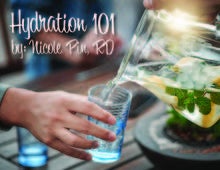Hydration 101
Being well hydrated means that we are taking in enough fluids to replace those lost through sweat, breathing and normal body functions. This is especially important in the summer because heat and humidity can significantly increase fluid losses — especially if you’re spending a lot of time outdoors.
The average adult human body is 57% water, so it’s no surprise that getting adequate fluids, especially water, is important for optimizing our energy level and body function throughout the day. Fluids help move nutrients and waste through our bodies, protect our joints and organs, maintain blood pressure, and aid in digestion.
 So what does dehydration actually look like?
So what does dehydration actually look like?
If you’re grabbing a drink because you’re thirsty, you are probably already dehydrated! Thirst is a hallmark sign of dehydration, along with dry mouth, dry lips, and feelings of dizziness. Headaches are also a very common sign, so next time you start to feel one coming on try drinking a tall glass of H2O before reaching for over the counter medications.
The best way to keep track of your hydration is by keeping an eye on the colour of your urine. Light straw coloured urine is a sign that you’re well hydrated. The amount of urine your body produces is also a good indicator, so if you find you aren’t stepping out to use the restroom very often, you may not be drinking enough fluids.
How much should you drink in a day?
You might guess 8 glasses of water a day, but this is a common misconception! Fluid needs, much like nutrient needs, are dependant on metabolism, activity level, and age. The average adult needs anywhere from 2-3L of fluid per day, but individual fluid needs can vary greatly.
In addition to beverages, there are lots of great foods that can be hydrating. Fruits, vegetables, yogurt and soups all have a high water content and contribute to our fluid intake.
Surviving the Summer Heat
It is especially important to keep well hydrated during the summer months. Exercise combined with warm weather increases our core body temperature. While our body’s natural cooling response is perspiration, our body has to work extra hard to keep cool in the summer heat.
If you’re planning to exercise during the summer try to capitalize on cooler times of the day—early morning or just before sunset. Check the weather before you step outside, and be prepared to scale down an intense workout or take breaks during your routine. A workout that may seem easy on a cool autumn day can be much more challenging when you’re fighting the hot, humid weather. Lastly, and most importantly, drink plenty of fluids before, during and after your workout. While water is the number one recommended beverage, for prolonged or very intense activity an electrolyte replacement may also be a good option.
Top 5 Beverages for hydration
With an endless supply of choices on the market, it can be tempting to choose a sugary or high calorie beverage. Here are some great healthy beverage options for keeping hydrated:
- Plain water
Water always has been, and always will be the #1 beverage for hydration. Water is calorie free, cost free and the most hydrating of all beverage choices. Invest in a good reusable water bottle and refill throughout the day!
- Infused water
Jazz up your plain old water with a slice of lemon, some fresh berries or cucumber and mint! There are endless combinations, and you can even keep a pitcher of infused water in your fridge for everyone to enjoy. Check out these ideas for infused water.
- Sparkling water
If you’re in need of a little fizz and flavour try soda water. There are lots of unsweetened naturally flavoured varieties on the market: lemon lime, cherry, pomegranate and peach to name a few! Sparkling water is a nutritious and thirst quenching option, and a good alternative to a soda craving.
- Unsweetened iced tea
Unsweetened iced teas are a great choice for any tea lovers out there. You’re probably seen them around your favourite coffee spot, but you can also make your own at home! Fruity herbal teas work well as a refreshing summer afternoon pick me up, or you can go the traditional route with a black tea like orange pekoe and a slice of lemon. Add some frozen fruit instead of sugar to give your tea a hint of sweetness.
- Milk & Milk Alternatives
Choose milk and milk alternatives as a hydrating option with the added bonus of nutrition! Dairy milk and milk alternatives such as almond or soy beverages are almost 90% water and provide nutrients like vitamin D and calcium. Dairy and soy beverages are also good sources of protein.
Have questions about staying well hydrated or choosing beverages on campus? Our UW Dietitian has answers! Email Nicole at nicole.pin@uwaterloo.ca.
Sources:
- https://www.todaysdietitian.com/news/062714_news.shtml
- https://www.unlockfood.ca/en/Articles/Water/Facts-on-Fluids-How-to-Stay-Hydrated.aspx
- https://food-guide.canada.ca/en/healthy-eating-recommendations/make-water-your-drink-of-choice/
- https://www.eatright.org/fitness/sports-and-performance/hydrate-right/exercise-safely-in-hot-weather
- https://courses.lumenlearning.com/boundless-ap/chapter/body-fluids/





